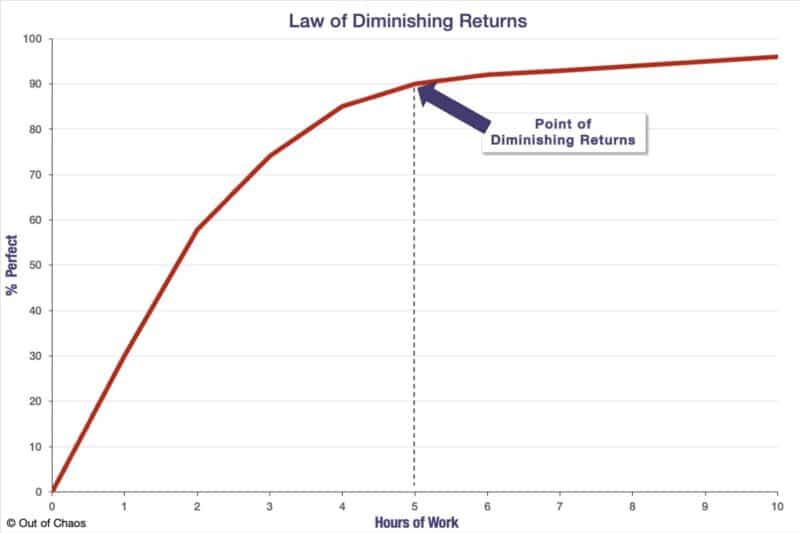
Striving to perform at your best is an admirable goal and worthy of pursuit. Perfectionism, on the other hand, is sneaky. It makes you think you’re trying to do your best. It is helpful to examine the Law of Diminishing Returns to understand how to overcome perfectionism and be productive. Simply put, this principle states that as you increase your effort, you make proportional increasing gains until a certain point. After that point, increasing the effort will not result in a proportional advancement.
Imagine the graph above represents a project where 100% complete is “perfect.” After the first five hours of work on your project, you achieve 90% completion. However, after working for another five hours, you see an increase of only 7%. Was spending that extra time worth such a meagre result? Maybe not. You could have worked on a different project and brought it up to the 90% level instead.
Even when you consciously acknowledge the Law of Diminishing Returns, it might be hard to convince yourself to stop working when you get to the “good enough” point. Here are some tips and tricks that can help you overcome perfectionism and be productive.
Create Structure
Before you start a project, it helps to define what “done” means. Ask what essential tasks must be in place and how long is a reasonable amount of time to spend on each task. Create measurable targets with defined work periods and due dates. For example, for writing my weekly blog post:
- Research: 3 hours. Tuesday 8:30am-noon.
- Write an outline: 1 hour. Wednesday between 1:00pm and 4:00pm.
- Write content: 2 hours. Thursday 8:30am-10:30am.
- Source and format images: 20 minutes. Thursday between 8:30am and noon.
- Final edit and schedule on website: 1 hour. Friday between 1:00pm and 4:00pm.
Time and Task Tracking
To overcome perfectionism and be productive, break down big projects into smaller tasks. Then, track the time you spend on each task. Use a productivity journal, a time tracking app or a simple kitchen timer. This will allow you to spend enough but not too much time working on a specific task.
Get Feedback
Many perfectionists view small mistakes or suggested improvements – even minor ones – as a sign of failure. Consequently, they find receiving feedback difficult and scary – even if they consciously know it shouldn’t be. If you have perfectionist tendencies, find someone you trust (e.g., supervisor, mentor, colleague, coworker) to help you be the judge of “done” or “good enough.” Consult this trusted colleague at several points in your project to keep it moving forward. Remember that there is almost always an opportunity to create Version 2.0 – the new and improved.
Talk to a Professional
Trying to overcome perfectionism and be productive isn’t easy – stress, anxiety can wear you down. Consider speaking with a therapist who can help you recognize and deal with the challenging emotions. You can also contact the Out of Chaos team to help you set up time and project management systems.
